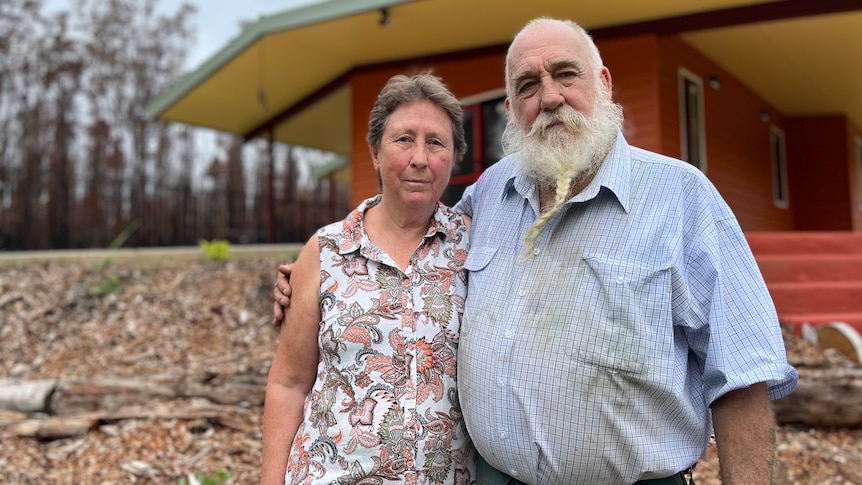When bushfires hit the northern New South Wales community of Nymboida in October, it was left without one of the most vital survival tools — a mobile phone service.
Key points:
- Nymboida residents were left with no telecommunications for five days during a bushfire in October
- It is the second time in four years that the remote community has dealt with damaging bushfires
- Optus, which is the main provider for Nymboida, has apologised to residents for the outage
“No phone connection, no text connection, nothing,” said Nymboida resident Annie Wolff.
The problem persisted for nearly five days.
Ms Wolff was an hour away from her Nymboida home, caring for her grandchildren in Grafton, when an emergency level bushfire threatened the remote community on Sunday, October 22.
When she tried to call her husband at home, she could not get through.
“I couldn’t contact him. He couldn’t contact me,” Ms Wolff said.
The intensity of the fire meant she was unable to return to her Nymboida home, which the couple was rebuilding after it was destroyed during the 2019-20 Black Summer bushfires.
Ms Wolff’s husband, Allan Mulligan, said the communications outage from the October fire left him vulnerable, once again, during the emergency.
“Something could happen and you wouldn’t know. I’m on my own and no one [would] know until it’s too late, probably,” he said.
The blaze burnt through more than 12,000 hectares and cut power to the Optus tower in Nymboida.
Residents say Optus is their main provider, with all those living on Glens Creek Road depending solely on the tower.
As a result of the outage, Ms Wolff was left relying on short updates from residents who were able to leave the fire ground in search of mobile reception.
“It was progressively distressing … everybody relies on this Optus tower. It is our only source of communications,” she said.
Similar to events in 2019, the couple and other Nymboida residents were forced to defend their homes without the support of Rural Fire Service alerts or triple-0 calls.
Left in the dark
Optus installed a generator on Tuesday, October 24, to restore power to the tower.
But Nymboida residents Daniel Evans and Ros Cooper said the generator was unsuccessful.
Asked about residents’ concerns with the generator, Optus said its technicians discovered further damage to the tower that had negatively impacted its power.
It confirmed services were restored on Saturday October 28, five days after communications had failed.
“Optus is committed to delivering the best possible network connection for customers,” Optus local general manager Chris Simon said.
“We apologise to any customers who have been impacted by the incident.”
But a week after communications had been restored, communications were again lost on Friday, November 8.
Mr Evans travelled to the mobile phone tower to investigate, not knowing a national Optus outage had caused the loss of communications.
Upon arriving at the tower he found the generator was still connected to the tower, but a burnt tree had fallen on it.
‘Stopgap’ measures not good enough
Shortly after the fire threat had passed in Nymboida, Optus unveiled nine mobile SatCat power units that would provide a temporary solution during emergency situations by using satellite transmissions.
But federal Member for Cowper Pat Conaghan said the units would not go far enough.
“They’re all stopgap measures. What we need are towers and … government investment,” he said.
Mr Conaghan has been advocating to receive funding through the federal Mobile Black Spot Program to improve telecommunications on the Mid North Coast.
Asked why the Mid North Coast did not receive funding in the Improving Mobile Coverage Round (IMCR) of the Mobile Black Spot Program, a spokesperson for Minister for Communications Michelle Rowland said the regions selected had fulfilled election commitments.
“The IMCR is only a small part of the government’s work to improve regional communications,” she said.
“It comes in addition to our $1.1 billion Better Connectivity Plan, which is the most significant investment in regional communications since the creation of the National Broadband Network.”
Mr Conaghan said regional telecommunications had become dire.
“It just goes to show how easy it is for these services to collapse when fires and floods hit,” he said.
“I really urge the telco providers in Cowper to lobby the government hard and to get those telecommunication towers that we desperately need.”
Ms Wolff said residents felt abandoned by Optus and were fed up with unreliable telecommunications during natural disasters.
She and other residents were lobbying for better protections to ensure they were not left in the dark again.
Mr Mulligan said communications should be at a level they did not have to “worry about”.
“When something like this happens, it’s not really good enough,” he said.
